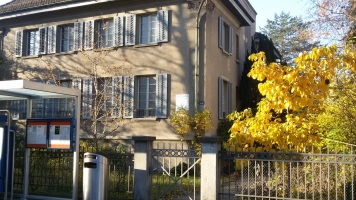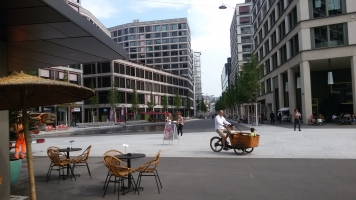Author Archives: Swiss-Immigration-Lawyer-Zurich-Bern-Basel-Geneva-Lausanne
Get residence permit in Switzerland through lump-sum taxation
For wealthy foreigners, moving to Switzerland is definitely worthwhile. If they do not work in Switzerland, they benefit from lump-sum taxation. In this case, the cantons can apply to the federal government for a special residence permit.
Taxation on the basis of expenditure is intended for foreigners who transfer their residence for tax purposes to Switzerland without actually being employed here.
The special regulation of lump-sum taxation is available to resident foreign nationals who do not carry out any gainful employment in Switzerland.
The total income and assets are not taxed , but the taxpayer’s cost of living
is used as a substitute basis of assessment. It is therefore not necessary to declare the actual worldwide income and assets. Once the tax base has been determined, as explained below, it is then subject to the normal tax rates. The associated tax planning options can open up very attractive taxation prospects.
Prerequisites for lump-sum taxation
– No Swiss citizenship
– Having taken up residence in Switzerland for the first time or
after an absence of at least ten years
– Not gainfully employed in Switzerland
In the case of married couples, these requirements must be met by both spouses
Moving to Switzerland as a retiree / pensioner
Switzerland is a popular destination for many retirees who want to emigrate and spend their retirement in an environment where everything works. Stunning landscapes, fresh air and political stability make Switzerland a retirement paradise. However, the cost of living is much higher than in many advanced countries. While the Swiss can afford this with their high income, the question is whether a foreign retirement income can keep up. It is therefore important to check the financial conditions and cost of living before thinking about moving to Switzerland.
Foreign nationals who are no longer gainfully employed can obtain a residence permit in Switzerland under certain conditions (Article 28 of the Federal Act on Foreign Nationals and Integration).
Prerequisites
– The minimum age of 55 years must be reached.
– The applicant must have special personal ties to Switzerland.
– The applicant must have the necessary financial means.
– The applicant must not be gainfully employed in Switzerland or abroad.
If you are required to obtain a Swiss visa, you must submit a visa application to the Swiss representation abroad responsible for your place of residence and enclose all necessary documents. Persons not requiring a visa can submit the application from abroad directly to the cantonal migration authority.
Which documents to submit
– Completed application form
– Pension certificate
– Confirmation that the pension will be transferred to Switzerland
– Certificate of the amount of any assets
– Extract from criminal record from home country
– Proof of special personal ties to Switzerland
– Curriculum vitae
– Written declaration that no gainful employment will be pursued either in Switzerland or abroad after entering Switzerland
– Family register, family booklet and death certificate of the spouse in the case of widowed persons
– Copy of the tenancy agreement
– Details or proof of your German language skills. If you have no knowledge of German, we expect you to attend a German course once you have entered Switzerland.
Retired persons are obliged to register with a Swiss health insurance company within three months of entering Switzerland. Basic insurance is compulsory and covers a wide range of medical services.
There are various insurers to choose from. Premiums vary, but the benefits of basic insurance are defined by law. Supplementary insurance allows for more individualized healthcare. They are voluntary and can be chosen freely. Premiums are based on age and state of health. Early conclusion can be advantageous, as insurers take pre-existing conditions into account.
Obtaining a residence permit by investment
In Switzerland, a B permit, i.e. a residence permit, can also be acquired through investment subject to certain conditions, particularly for people from third countries. It is important to know that this is not a standard procedure and that certain conditions must be met that go beyond a simple investment.
To qualify you must invest at least half a million Swiss francs (converted into euros) in a small to medium-sized company in your chosen canton of residence; simply depositing the funds in a Swiss bank or buying shares in a listed company is not sufficient. Your investment must represent an economic value for the region through the creation of jobs.
Economic interest:
The approval success depends on the interest of the Swiss economy. This can be demonstrated by the creation of jobs or investments.
Financial resources:
Proof must be provided that sufficient financial resources are available to cover the cost of living and the operation of the company. The expected income from the planned business activity must be sufficient to cover operating costs and living expenses (e.g. business plan, budgeted balance sheet, credit liabilities). In addition, it must be possible to obtain the necessary facilities, including business premises (e.g. rental agreement). This presupposes that sufficient start-up capital is available.
You must reside in Switzerland for the majority of the year, although exceptions are possible if you are acting in good faith. However, you are not eligible for this program if you have your main residence in another country and only visit Switzerland during the summer months.
Finally, unless you are a prominent artist, you must prove a connection to Switzerland, for example through previous visits, Swiss acquaintances, relatives living in Switzerland or other connections.
Early issuance of a C permanent residence permit
Early granting of settlement permit C.
Foreign nationals who hold a residence permit and have successfully integrated can apply for a settlement permit to be issued early after an orderly and uninterrupted stay of five years. There are various cumulative criteria that the applicant must meet in order to establish successful integration and to be granted a settlement permit early. In principle, families (married couples or parents with underage children) can only submit an application for early issue of a permanent residence permit together.
For applications from single adult foreigners, it is assumed that they have an absolutely impeccable reputation, that they provide a certificate attesting to their command of the German language according to level B1 of the European Language Portfolio (oral and written) and that they have been gainfully employed during the last five years of their stay in Switzerland and have never had to be supported by social welfare.
Children who are not yet of school age are included in their parents’ decision. Children up to the age of twelve who are required to attend school must provide a confirmation from the school authorities which provides information about their performance at school and certifies that they are well integrated (including an assessment of their German language skills). Minor children over the age of twelve must meet the same requirements as adult individuals.
The time requirements for nationals of certain countries are already fulfilled after an uninterrupted and proper stay of five years on the basis of settlement contracts and settlement agreements.
In the case of EU or EFTA nationals, the granting of a permanent residence permit is governed by the provisions of the FNIA and the settlement agreements, as the Agreement on the Free Movement of Persons with the EU does not contain any provisions on permanent residence permits.
Citizens of Austria, Belgium, Denmark, Finland, France, Germany, Greece, Ireland, Italy, Luxembourg, the Netherlands, Portugal, Spain, Sweden and EFTA (Iceland, Liechtenstein and Norway) are granted a permanent residence permit on the basis of settlement agreements or on the basis of reciprocal rights after a proper and uninterrupted stay of five years, provided they meet the necessary requirements. No such agreements exist for nationals of other EU member states.
Revocation of a permanent residence permit C and removal from Switzerland.
Appeal Lawyer: / Revocation of a permanent residence permit C in Switzerland.
In Switzerland, a permanent residence permit (C permit) can be revoked provided certain conditions are met, which are set out in the Foreign Nationals and Integration Act (FNIA). The grounds for revocation include significant or repeated violations of public safety and order, a long-term prison sentence or a threat to internal or external security. Revocation may also occur if material facts were concealed or concealed during the permit procedure.
The longer the person has been in Switzerland, the stricter the requirements for revoking a C permit. The settlement permit of persons who have lived in Switzerland for more than 15 years or were born here should only be revoked with particular caution. Revocation is possible if the person has been sentenced to a long-term prison sentence of more than one year. Several custodial sentences of less than one year may not be cumulated (BGE 139 I 31 E.2.1).
In the case of repeated and serious criminal offenses, revocation is not ruled out even if the person was born in Switzerland and has spent their entire life in Switzerland. In the case of violent crimes, the Federal Supreme Court protects the revocation of a person’s home country if the public interest in the person’s departure outweighs their private interest in remaining in their home country (Federal Supreme Court ruling 2C_642/2016 of July 20, 2017).
Should you be faced and affected by such cases, you should seek advice from an experienced immigration lawyer to check your rights and legal options.
We provide answers to all legal questions relating to immigration law in Switzerland. We can help you in all matters relating to, issuing and revocation of visas, residence permits, permanent residence permits, marriage and family reunification, reverse family reunification, divorce and right to be heard, statements, appeals, complaints, Zurich Migration Office, Aargau and much more.
We provide you with competent and solution-oriented support and represent you with a great deal of practical experience before the Zurich Migration Office and the courts of the Canton of Zurich. Our attorneys are registered in the Zurich cantonal register of attorneys and are licensed to conduct proceedings before all courts throughout Switzerland, including the Federal Supreme Court.
Moving to Switzerland From India, UAE, Ireland China etc
Switzerland’s remarkably high wages by international standards and the relatively low tax burden in many cantons are important factors that particularly attract many highly qualified people from India, UAE, Ireland China etc to settle in Switzerland. In terms of employment, Switzerland is characterized by excellent opportunities for qualified professionals in fields such as engineering, information technology, financial services and medicine offering excellent career prospects. In addition, the unemployment rate in Switzerland remains remarkably low. For families, Switzerland offers a high level of security, an excellent education system and numerous leisure opportunities. The criteria for obtaining a residence permit vary according to nationality, length of stay and purpose of stay.
Self-employed foreign nationals wishing to work in Switzerland require a permit from their first day of work. Persons whose spouses have Swiss citizenship or a permanent residence permit (C permit) are exempt from this regulation.
The Office for Economic Affairs examines the application from a labor market perspective and forwards it to the Migration Service. The Migration Service examines the relevant immigration aspects.
If your application is approved, the Migration Service will issue a residence permit. This depends on the duration of your employment or the nature of your economic activity. Once issued, you will receive your permit from your municipality of residence.
Work permit:
As a rule, a work permit is only issued if a Swiss employer is looking for a qualified worker and the competent authorities (cantonal and federal) approve this.
There are several stages in the procedure for obtaining a work permit.
An application to take up gainful employment (or a work permit) must be submitted by the employer to the Office of Economic Affairs (AWI).
You can find more information here.
The AWI issues a preliminary labor market decision (work permit).
The AWI forwards the positive preliminary labor market decision to the State Secretariat for Migration (SEM) for approval.
If the SEM gives its approval, all documents are forwarded to the Migration Office so that the application for a work permit can be examined from the point of view of immigration law. This is because a permit can be refused despite the existence of a positive labor market decision if there are grounds for revocation.
If the requirements under immigration law are also met, the Migration Office will issue the permit for gainful employment.
If the person concerned is still abroad when the decision is approved, the Migration Office will authorize the foreign representation to issue a visa by means of an entry permit. If there is no visa requirement, the Migration Office will issue a confirmation of authorization to the employer.
After entry, registration takes place at the municipality. The person concerned will also receive an appointment at the municipality to have their biometric data recorded. You can find out everything about your biometric ID card here.
The person concerned must appear in person at the Migration Office to have their biometric data recorded. The ID card will be produced and sent to the person concerned by post.
Other options in the context of short-term gainful employment
Foreign nationals who have received an entry permit to work in Switzerland or to provide cross-border services for a total of four months within a 12-month period do not have to register and do not require a foreigner’s identity card. Instead of a foreigner’s identity card, the persons concerned will receive an entry permit. Persons requiring a visa require a visa issued by the Swiss representation abroad in addition to the entry permit.
If you are a non-EU/EFTA national, you can only obtain a work permit in Switzerland if you hold a position as a manager, specialist or other qualified professional. The professional qualifications must match the new duties. When assessing applications for a residence permit, factors such as professional qualifications, adaptability in the professional and social environment, language skills and age are also taken into account in order to ensure sustainable integration into the Swiss labor market and society.
All foreign employees are entitled to the same salary and working conditions as Swiss employees. This provision is intended to ensure equal treatment of foreign and Swiss employees. Employers are obliged to provide the labor market authority with information on the duration of the employment relationship, the working conditions and the salary. The employment contract must be comprehensive and up to date and must be based on the conditions customary in the location and industry. The federal government’s salary calculator at www.salarium.ch can be a useful tool when calculating your future salaries.
Around 3/4 of the labor market in Switzerland consists of three strong, dynamic sectors:
mechanical engineerin
the chemical industry and
the service sector.
In addition, British specialists are sought in the following areas
Medicine and nursing
Technology and engineering
Teachers
Employees in the hospitality industry (especially in the tourist strongholds)
What are the advantages of moving to Switzerland?
Switzerland is a country with a low crime rate, a good labor market and a transport system that is unmatched anywhere in the world. The economy in Switzerland is very strong and will have one of the highest per capita GDP in the world. According to the U.S. News & World Report, Switzerland is the safest country in the world and several Swiss cities such as Zurich, Geneva, Basel and Bern top the list of the world’s most liveable cities.
Switzerland has long been a country for people who want to live where clean air, a good standard of living and safe streets are a priority. Switzerland is a safe place to live, surrounded by people with strong values and ambitions. Apart from that, switzerland’s income as well as waelth taxes are among the lowest among the industrialized nations. Apart from this, income and wealth taxes in Switzerland are among the lowest in the industrialized world.
Retired people can be granted a residence permit if the following requirements are met cumulatively:
older than 55 years
Proof of close ties to Switzerland
Proof of sufficient financial means
neither gainfully employed abroad nor in Switzerland
Wealthy Citizens:
If you have enough money and are not dependent on state aid, you can live in Switzerland as long as you meet the other residence requirements. You must be able to prove all of this, when applying for a residence permit. To emigrate to Switzerland as a wealthy foreign citizen, it is highly advisable to consult a qualified immigration lawyer who can help you with the specific requirements for the residence permit. It is important to prove sufficient assets (often at least CHF 10 million) and a reasonable standard of living (e.g. CHF 400,000 to 600,000 per year) in order to obtain a residence permit.
Permit B (residence permit)
Permit C (settlement permit)
Permit Ci (residence permit with gainful employment for third-country nationals)
Permit G (cross-border commuter permit)
Permit L (short-term residence permit)
Permit F (temporarily admitted foreign nationals)
Permit N (asylum seekers)
Permit S (temporary protection for persons in need of protection)
The main countries from which English
speakers want to move to Switzerland . . .
Moving to Switzerland from Australia
Moving to Switzerland from Canada
Moving to Switzerland from US
Moving to Switzerland from UAE
Moving to Switzerland from UK
Moving to Switzerland from Ireland
Moving to Switzerland from New Zealand
Moving to Switzerland from China Hongkong
Moving to Switzerland from India
Moving to Switzerland from Singapore or Malaysia
Moving to Switzerland From Canada, Australia, New Zealand or Singapore
It is generally assumed that the Swiss have a very positive perception towards Canadians, Australians and New Zealanders. So if you are planning to move to Switzerland from one of these countries, your chances of finding a job and making new friends are very much intact.
Citizens of Canada, New Zealand or Australia must make certain arrangements to enter Switzerland in order to live and work in Switzerland, regardless of the duration of their stay, and like all third-country nationals require a residence permit.
Work permit:
As a rule, a work permit is only issued if a Swiss employer is looking for a qualified worker and the competent authorities (cantonal and federal) approve this.
Canadian, New Zealand and Australian nationals can enter Switzerland without a visa for tourism purposes for up to 90 days. However, a residence permit is required for a longer stay or to take up employment. The application for such a permit depends on various factors, such as the type of employment and the respective cantonal regulations.
There are several stages in the procedure for obtaining a work permit.
An application to take up gainful employment (or a work permit) must be submitted by the employer to the Office of Economic Affairs (AWI).
You can find more information here.
The AWI issues a preliminary labor market decision (work permit).
The AWI forwards the positive preliminary labor market decision to the State Secretariat for Migration (SEM) for approval.
If the SEM gives its approval, all documents are forwarded to the Migration Office so that the application for a work permit can be examined from the point of view of immigration law. This is because a permit can be refused despite the existence of a positive labor market decision if there are grounds for revocation.
If the requirements under immigration law are also met, the Migration Office will issue the permit for gainful employment.
If the person concerned is still abroad when the decision is approved, the Migration Office will authorize the foreign representation to issue a visa by means of an entry permit. If there is no visa requirement, the Migration Office will issue a confirmation of authorization to the employer.
After entry, registration takes place at the municipality. The person concerned will also receive an appointment at the municipality to have their biometric data recorded. You can find out everything about your biometric ID card here.
The person concerned must appear in person at the Migration Office to have their biometric data recorded. The ID card will be produced and sent to the person concerned by post.
Other options in the context of short-term gainful employment
Foreign nationals who have received an entry permit to work in Switzerland or to provide cross-border services for a total of four months within a 12-month period do not have to register and do not require a foreigner’s identity card. Instead of a foreigner’s identity card, the persons concerned will receive an entry permit. Persons requiring a visa require a visa issued by the Swiss representation abroad in addition to the entry permit.
Around 3/4 of the labor market in Switzerland consists of three strong, dynamic sectors:
mechanical engineerin
the chemical industry and
the service sector.
In addition, British specialists are sought in the following areas
Medicine and nursing
Technology and engineering
Teachers
Employees in the hospitality industry (especially in the tourist strongholds)
What are the advantages of moving to Switzerland?
Switzerland is a country with a low crime rate, a good labor market and a transport system that is unmatched anywhere in the world. The economy in Switzerland is very strong and will have one of the highest per capita GDP in the world. According to the U.S. News & World Report, Switzerland is the safest country in the world and several Swiss cities such as Zurich, Geneva, Basel and Bern top the list of the world’s most liveable cities.
Switzerland has long been a country for people who want to live where clean air, a good standard of living and safe streets are a priority. Switzerland is a safe place to live, surrounded by people with strong values and ambitions. Apart from that, switzerland’s income as well as waelth taxes are among the lowest among the industrialized nations. Apart from this, income and wealth taxes in Switzerland are among the lowest in the industrialized world.
Retired Canadia, Australian or New Zealand citizens can be granted a residence permit if the following requirements are met cumulatively:
older than 55 years
Proof of close ties to Switzerland
Proof of sufficient financial means
neither gainfully employed abroad nor in Switzerland
Wealthy Citizens:
If you have enough money and are not dependent on state aid, you can live in Switzerland as long as you meet the other residence requirements. You must be able to prove all of this, when applying for a residence permit. To emigrate to Switzerland as a wealthy foreign citizen, it is highly advisable to consult a qualified immigration lawyer who can help you with the specific requirements for the residence permit. It is important to prove sufficient assets (often at least CHF 10 million) and a reasonable standard of living (e.g. CHF 400,000 to 600,000 per year) in order to obtain a residence permit.
Permit B (residence permit)
Permit C (settlement permit)
Permit Ci (residence permit with gainful employment for third-country nationals)
Permit G (cross-border commuter permit)
Permit L (short-term residence permit)
Permit F (temporarily admitted foreign nationals)
Permit N (asylum seekers)
Permit S (temporary protection for persons in need of protection)
The main countries from which English
speakers want to move to Switzerland . . .
Moving to Switzerland from Australia
Moving to Switzerland from Canada
Moving to Switzerland from US
Moving to Switzerland from UAE
Moving to Switzerland from UK
Moving to Switzerland from Ireland
Moving to Switzerland from New Zealand
Moving to Switzerland from China or Hongkong
Moving to Switzerland from India
Moving to Switzerland from Singapore or Malaysia
Moving to Switzerland From UK / Immigration Lawyer
Admission to switzerland of UK nationals
In accordance with the departure of the United Kingdom (UK) from the European Union (EU) on January 31, 2020 as well as the end of the transition phase on December 31, 2020, Switzerland’s Agreement on the Free Movement of Persons (AFMP) no longer applies to the UK.
Preconditions for admission of UK Citizens to Switzerland:
As of January 1, 2021, the admission requirements of the Foreign Nationals and Integration Act (FNIA) apply to newly arriving workers from the UK. Like all other third countries, only qualified executives and highly qualified specialists can be admitted from the UK, as long as this is in the overall economic interest of Switzerland. Individuals with special professional knowledge or skills may be admitted if there is a proven need for their admission. Swiss nationals and EU/EFTA nationals have priority on the Swiss labor market and the salary and working conditions customary for the location, profession and industry must be observed.
An overview of the basic admission criteria for non-EU/EFTA nationals in accordance with the Foreign Nationals and Integration Act (FNIA):
Basic principles for admission to the labor market
The following requirements must also be met:
Admission must be in Switzerland’s overall economic interest. Only managers, specialists and other qualified workers can be authorized. Priority must be given to Swiss nationals. Priority is given to Swiss nationals, EU/EFTA nationals, permanent residents and foreign nationals entitled to work, temporarily admitted persons and those who have been granted temporary protection. Employers must comply with the salary and working conditions customary in the location, profession and industry.
An application for a work permit must be submitted by the employer to the competent cantonal migration or labor market authority.
Special regulations for British nationals: Since the end of the free movement of persons between Switzerland and the UK in 2021, quotas have applied to UK citizens in the same way as for third-country nationals. In 2025, up to 3,500 workers can still be recruited from the UK (2,100 B permits and 1,400 L permits).
UK citizens can stay in Switzerland for up to 90 days without a visa. However, if you wish to move to Switzerland permanently, you will need to take certain steps to begin your life in this Alpine nation. After entering Switzerland, you must first apply for a long-term residence visa. Immediately after your arrival in Switzerland, you should register with the cantonal immigration and labor market authorities.
Around 3/4 of the labor market in Switzerland consists of three strong, dynamic sectors:
mechanical engineerin
the chemical industry and
the service sector.
In addition, British specialists are sought in the following areas
Medicine and nursing
Technology and engineering
Teachers
Employees in the hospitality industry (especially in the tourist strongholds)
What are the advantages of moving to Switzerland?
Switzerland is a country with a low crime rate, a good labor market and a transport system that is unmatched anywhere in the world. The economy in Switzerland is very strong and will have one of the highest per capita GDP in the world. According to the U.S. News & World Report, Switzerland is the safest country in the world and several Swiss cities such as Zurich, Geneva, Basel and Bern top the list of the world’s most liveable cities.
Switzerland has long been a country for people who want to live where clean air, a good standard of living and safe streets are a priority. Switzerland is a safe place to live, surrounded by people with strong values and ambitions. Apart from that, switzerland’s income as well as waelth taxes are among the lowest among the industrialized nations. Apart from this, income and wealth taxes in Switzerland are among the lowest in the industrialized world.
Retired UK citizens can be granted a residence permit if the following requirements are met cumulatively:
older than 55 years
Proof of close ties to Switzerland
Proof of sufficient financial means
neither gainfully employed abroad nor in Switzerland
Wealthy UK Citizens:
If you have enough money and are not dependent on state aid, you can live in Switzerland as long as you meet the other residence requirements. You must be able to prove all of this, when applying for a residence permit. To emigrate to Switzerland as a wealthy UK Citizen, it is highly advisable to consult a qualified immigration lawyer who can help you with the specific requirements for the residence permit. It is important to prove sufficient assets (often at least CHF 10 million) and a reasonable standard of living (e.g. CHF 400,000 to 600,000 per year) in order to obtain a residence permit.
Up to 90 days per calendar year for the cross-border provision of services.
Based on the temporary agreement between Switzerland and the United Kingdom on the mobility of service providers (EAER press release), the online notification procedure will continue to apply for authorizations of cross-border service providers from the UK for up to 90 working days per calendar year (short-term gainful employment). Furthermore, this applies to posted workers from companies based in the UK, regardless of their nationality, and self-employed service providers based in the UK who are UK nationals.
Moving to Switzerland From USA / Immigration Lawyer
Switzerland is the most sophisticated and developed country in the world with wonderful scope for economic opportunities. Enchanting mountains, countless lakes, an incomparably high quality of life and excellent salaries are all reasons for an American to move to Switzerland.
American citizens can stay in Switzerland for up to 90 days without a visa. However, if you wish to move to Switzerland permanently, you will need to take certain steps to begin your life in this Alpine nation. After entering Switzerland, you must first apply for a long-term residence visa. Immediately after your arrival in Switzerland, you should register with the cantonal immigration and labor market authorities.
Your future employer must show that it is in Switzerland’s economic interest to employ you and that they have been unable to find suitable qualified personnel within the Swiss and EU/EFTA recruitment agencies. The employer must provide you with the same salary and working conditions as Swiss nationals.
Around 3/4 of the labor market in Switzerland consists of three strong, dynamic sectors:
mechanical engineering
the chemical industry and
the service sector.
In addition, American specialists are sought in the following areas
Medicine and nursing
Technology and engineering
Teachers
Employees in the hospitality industry (especially in the tourist strongholds)
American native english teachers are highly sought after in most international schools,
especially because of the global aspects that american dialect brings to finance, technology and culture.
What are the advantages of moving to Switzerland?
Switzerland is a country with a low crime rate, a good labor market and a transport system that is unmatched anywhere in the world. The economy in Switzerland is very strong and will have one of the highest per capita GDP in the world. According to the U.S. News & World Report, Switzerland is the safest country in the world and several Swiss cities such as Zurich, Geneva, Basel and Bern top the list of the world’s most liveable cities.
Switzerland has long been a country for people who want to live where clean air, a good standard of living and safe streets are a priority. Switzerland is a safe place to live, surrounded by people with strong values and ambitions. Apart from that, switzerland’s income as well as waelth taxes are among the lowest among the industrialized nations.
Apart from this, income and wealth taxes in Switzerland are among the lowest in the industrialized world.
Retired US citizens can be granted a residence permit if the following requirements are met cumulatively:
older than 55 years
Proof of close ties to Switzerland
Proof of sufficient financial means
neither gainfully employed abroad nor in Switzerland
Wealthy Americans:
If you have enough money and are not dependent on state aid, you can live in Switzerland as long as you meet the other residence requirements. You must be able to prove all of this, when applying for a residence permit. To emigrate to Switzerland as a wealthy American, it is highly advisable to consult a qualified immigration lawyer who can help you with the specific requirements for the residence permit. It is important to prove sufficient assets (often at least CHF 10 million) and a reasonable standard of living (e.g. CHF 400,000 to 600,000 per year) in order to obtain a residence permit.
American English opens up an opportunity for US citizens seeking employment in Switzerland. The country has evolved from a purely quadrilingual nation to a truly multilingual society. The influence of globalization is unmistakable here and has had a significant impact on the Swiss linguistic landscape.
For example, a significant number of academic publications or information technology applications are written in English, making proficiency in the language increasingly important. Furthermore, due to the increasing internationalization of the workforce, Americans with higher education and a desire to learn a local language can use their English language skills as a valuable asset, not only to find a job, but also to maintain friendships.
CNN reports on US couple who emigrated to Switzerland. “It feels safe here,” says an American couple who emigrated to Switzerland. In 2023, the family moved from Wisconsin to Basel with their three children (aged between six and twelve at the time).
One other family was quoted in the newspaper after moving to Switzerland as saying;
“Switzerland is a beautiful country. Its federal system has some similarities to the US, but it is a very stable and democratic country.” “We were increasingly concerned about shooting sprees in American schools,” the couple said. “We agreed that our children would be a lot safer in Switzerland.”
According to another couple, the move to Switzerland was not an escape, but a decision that resulted from a strong desire for security and a better environment for their family. The couple also highlights the public transportation. The father commutes to work three times a week by train from Zug to Zurich. The trains are “always on time, clean and quiet.
“I’ve been living in Switzerland since 2017 and can’t imagine going back to the USA. The lifestyle here is so much healthier than in North America.”
One British expat was quoted saying;
“I moved to Switzerland from the UK and will never go back. I look forward to every season in Switzerland: winter skiing, spring trips to the south to get some early sun, swimming in the lakes, fall hiking in the mountains.”












